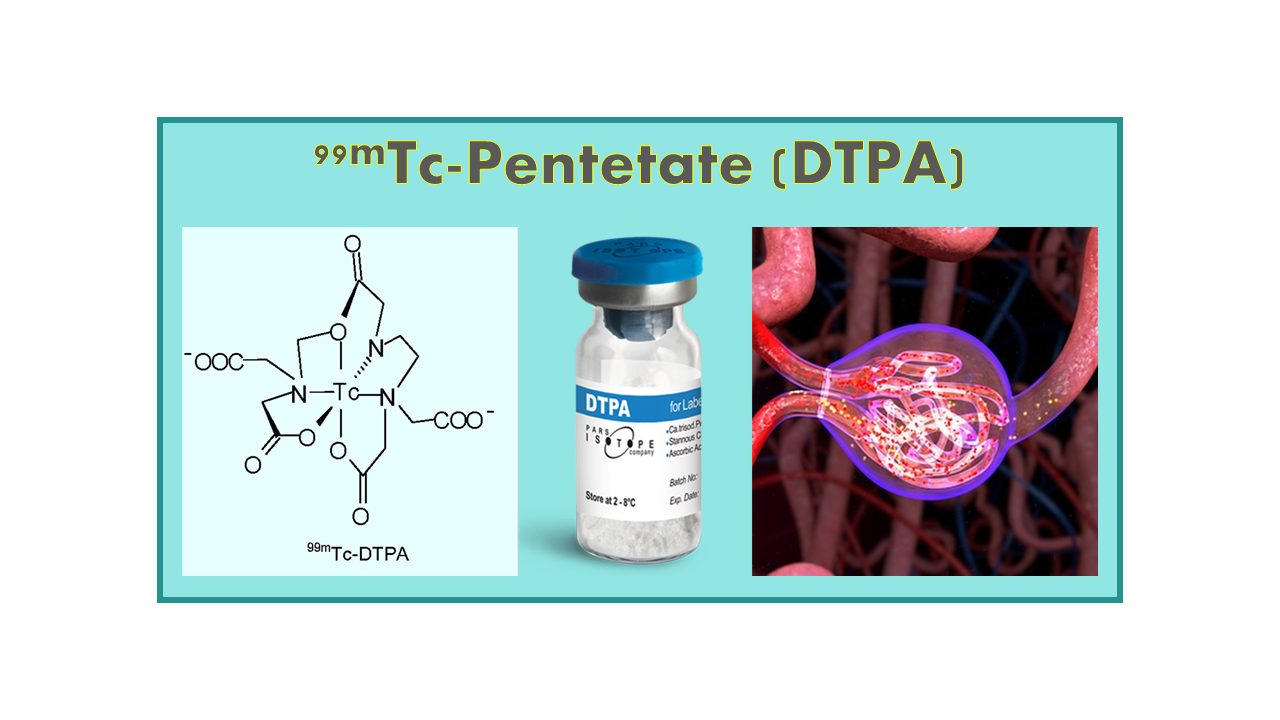
99mTc-Pentetate (DTPA)
April 13, 2024
99mTc-Pentetate (DTPA) is a radiopharmaceutical agent commonly used in nuclear medicine for assessing renal perfusion and estimating glomerular filtration rate (GFR). It is a technetium-99m-labeled diethylenetriaminepentaacetic acid (DTPA) compound that is injected intravenously for renal imaging studies.
The radiotracer 99mTc-Pentetate emits gamma radiation, allowing for non-invasive imaging of the kidneys using a gamma camera. By tracking the distribution of 99mTc-Pentetate in the kidneys, healthcare providers can evaluate renal perfusion, renal function, and GFR. Renal perfusion refers to the blood flow to the kidneys, while GFR is a measure of how well the kidneys are filtering waste products from the blood.
The assessment of renal perfusion and GFR using 99mTc-Pentetate is crucial in diagnosing and monitoring various kidney conditions, such as chronic kidney disease, renal artery stenosis, and renal transplant function. It provides valuable information about the overall health and function of the kidneys, helping healthcare providers make informed decisions about patient care and treatment strategies.
Overall, 99mTc-Pentetate is a valuable tool in nuclear medicine for evaluating renal function and perfusion, playing a key role in the diagnosis and management of kidney-related disorders.
Description
DTPA stands for Diethylene Triamine Penta Acetic acid and is usually provided as a calcium trisodium hydrate salt (DTPA-Ca). 99mTc-DTPA (Pentetate, Tc04) is obtained by combining a DTPA lyophilizate with freshly extracted 99mTc solution and used via intravenous, intrathecal, inhalation and oral routes for diagnostic purposes in neurology, pulmonary imaging gastroenterology and nephrology. This is a generic tracer.
Clinical applications
In kidney imaging, 99mTc-DTPA is used to assess renal perfusion and to estimate glomerular filtration rate (1-2 mCi doses). It is used also for renal and urinary tract imaging as well as for cystography (bladder imaging). In brain imaging it is used to evaluate intracranial lesions (5–20 mCi). Another application targets gastroesophageal reflux and gastric emptying (0.3–0.6 mCi).
Saline solutions of 99mTc-DTPA can be transformed into an aerosol (sub-micrometer particles) that is inhaled for lung imaging. Such an exam delivers a dose of radiation to the patient that is lower than 81mKr and much lower than 133Xe (2-30 mCi). In ventilation imaging, a nebulizer is needed (e.g., UltraVent – Mallinckrodt, SmartVent – Diagnostic Imaging Ltd). In the US, this indication was not approved for 99mTc-DTPA for a long time, but it appeared that this off-label use was more frequent than combined renal and brain imaging (Medicare figures around 1,500 doses/year). In December 2017, Draximage DTPA received FDA approval for these pulmonary indications (doses 25-50 mCi aerosol).
Availability and price
Several manufacturers are offering this standard generic tracer as a cold kit to be labeled with 99mTc, under the names DTPA (ANSTO), DTPA (Draximage), DTPA (IDB/AAA), DTPA (Pars Isotope), MON-DTPA (Monrol), Pentacis® (IBA Molecular (Curium); marketed since 1984; EU MA 1996), Pentatech (DiaMed, Russian MA 1982), PoltechDTPA (POLATOM), Renon (Medi-Radiopharma), ROTOP-DTPA (ROTOP) – Techne® DTPA (Fuji Film), TCK-7 (BRIT), and from Wuxi Jiangyuan.
The first US MAs were obtained in 1976 (GE Healthcare, CISbio).
The following formulations have been withdrawn from the market: Amerscan Pentetate II (GE Healthcare; EU MA 2003), AN-DTPA (Pharmalucence – withdrawn, replaced by Pentetate kit), Eritrotec (Amersham; EU MA 1999, discontinued 2005), DTPAScint (BMS; EU MA 1996, discontinued 2006), Techneplex and Renotec/ferpentetate (Bracco), Technescan-DTPA® (Mallinckrodt; marketed since 1995; EU MA 1998), Pentetate kit (Pharmalucence, discontinued in 2012).
In the US, Jubilant Draximage and Pharmalucence are the only companies offering this tracer. In May 2014; Draximage announced a one-time price hike (from US$25 to US$140 per patient dose) to compensate money losses on this tracer, at the same time they increased the price of 99mTc-MAA.
Competition
99mTc-Pentetate is a very common product available from most radiopharmaceutical manufacturers.
Comments
This generic compound is used routinely and belongs to the standard products of a nuclear medicine department.